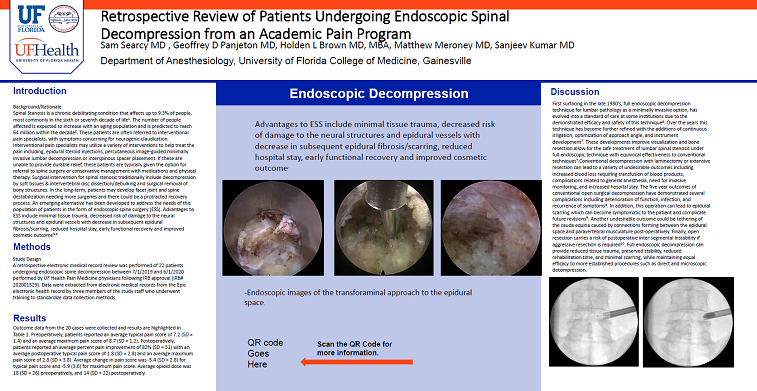2021 FSA Posters
P015: RETROSPECTIVE REVIEW OF PATIENTS UNDERGOING ENDOSCOPIC SPINAL DECOMPRESSION FROM AN ACADEMIC PAIN PROGRAM
Holden Brown; Geoffrey Panjeton, MD; Sam Searcy, MD; Sanjeev Kumar, MD; University of Florida, Department of Anesthesiology
Background: Spinal Stenosis is a chronic debilitating condition that affects up to 9.3% of people, most commonly in the sixth or seventh decade of life1. The number of people affected is expected to increase with an aging population and is predicted to reach 64 million within the decade2. Symptomatic spinal stenosis, like other spine pathologies including disc herniation and degenerative disc disease amongst others, traditionally required open decompressive surgical approach if more conservative approaches fail. An emerging alternative has been developed to address the needs of this population of patients in the form of endoscopic spine surgery (ESS). Advantages to ESS include minimal tissue trauma, decreased risk of damage to the neurovascular structures, minimal epidural fibrosis/scarring, reduced hospital stay, early functional recovery and improved cosmetic outcome3,4.
Objectives: The purpose of this study is to review the outcomes of patients undergoing endoscopic spinal decompression from an academic pain program.
Study Design: Retrospective Review of Electronic Medical Records (IRB # IRB202001529)
Setting: UF Health Division of Pain Medicine
Methods: Twenty patients underwent successful endoscopic lumbar spinal decompression surgery from 7/1/2019 to 6/1/2020. The majority of cases were performed at L4-5 (n=14), followed by an equal number (n=3) cases at L3-4 and L5-S1.
Results: Patients had an average pain reduction of 82% (SD = 31) resulting in average postoperative pain score of 1.8 (SD = 2.8).
Limitations: The results presented of a relatively small sample size, did not include a randomized design, and had a limited follow-up window.
Conclusions: This study highlights the effectiveness, safety, and reproducibility of the positive results for patients at this institution.

